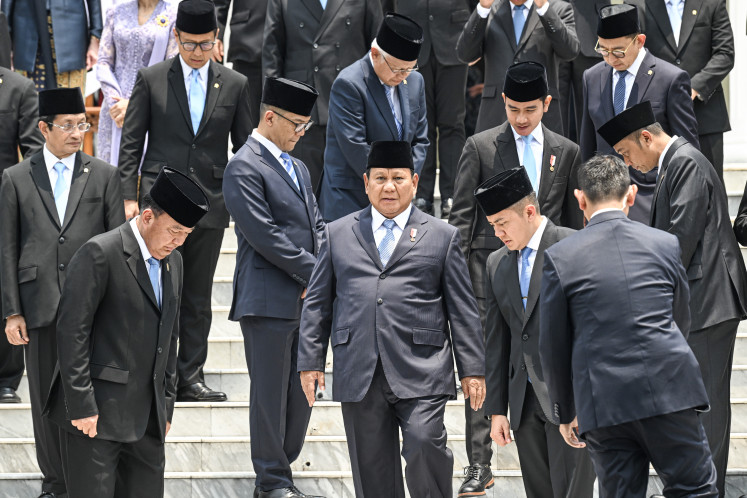Popular Reads
Top Results
Can't find what you're looking for?
View all search resultsPopular Reads
Top Results
Can't find what you're looking for?
View all search resultsInsufficiently Korean: Top retailer tripped by ties to Japan
When South Korean Chung Yu-suk read an article about retailer Lotte's chocolate ads featuring a Japanese figure skating star, he was so angered he started an online group urging Koreans to boycott their country's top retailer
Change text size
Gift Premium Articles
to Anyone
W
hen South Korean Chung Yu-suk read an article about retailer Lotte's chocolate ads featuring a Japanese figure skating star, he was so angered he started an online group urging Koreans to boycott their country's top retailer.
Chung is one of a growing number of South Koreans vowing to punish Lotte after a family battle for control of the company spilled out in public and highlighted their deep links to Japan, Korea's former colonizer.
The choice of Japanese skater Mao Asada for the advertisement that first appeared years ago was not surprising since it was aimed at the Japanese market, where Lotte also has businesses.
But in South Korea, it only reinforced perceptions Lotte is more Japanese than Korean and particularly because Asada is considered the chief rival of the South's beloved Kim Yuna, an Olympic gold medalist.
"I don't understand how Lotte Japan picked her knowing that she would compete with Kim Yuna," said Chung, a self-employed 45-year-old who lives in Daegu city in the country's southeast.
The battle for control of Lotte pits the family's youngest scion against its aging patriarch and his oldest son. As the brothers appeared in public to blame each other for the increasingly ugly power struggle, South Koreans were reminded of two facts they found unpalatable: Neither of the men who both claim they are South Korean speaks Korean fluently and the holding company of Lotte is based in Japan with Japanese shareholders.
It's unclear how damaging the boycott call will be for Lotte in South Korea, where the company earns most of its profits. But the anti-Lotte activists have chosen an opportune moment to ignite sentiment against the company.
South Korea will mark the 70th anniversary of independence from Japan's colonial rule on Saturday, a moment of national reflection that comes during a period of particularly strained ties between the East Asian neighbors. South Korea's government says Japan has failed to atone for forced labor, forced prostitution and other brutalities during its colonial rule.
National flags are on display on streets and on buildings. A movie about Korean independence fighters in the 1930s attempting to assassinate a Japanese military commander and a pro-Japanese businessman is a box office hit. With over 9 million tickets sold, "Assassination" is set to become the most popular Korean movie this year. On Wednesday, an 80-year-old man set himself on fire during an anti-Japan rally in front of the Japanese Embassy in Seoul.
Lotte was founded in 1948 as a post-war chewing gum maker in Japan by Shin Kyuk-ho, 92, who moved to Japan when Korean Peninsula was under Japan's colonial rule. He married a Japanese woman and they had two sons in Japan, who are now battling over the business empire.
Shin started his business in South Korea in 1967, and it grew into one of the country's biggest conglomerates behind the likes of Samsung and Hyundai.
It is difficult to avoid Lotte living in South Korea where the largest retailers are Lotte supermarkets and department stores. At Lotte stores, South Koreans can buy liquor, snacks and gum swiping a Lotte credit card. Multitudes of Koreans live in high-rises built by Lotte and watch movies at Lotte cinemas.
The company is concerned enough by the boycott calls for its chairman Shin Dong-bin, who is the younger son of founder Shin Kyuk-ho, to hold a news conference in South Korea on Tuesday at which he declared Lotte belongs to "our country."
Public opinion turned sharply against the company after television appearances by the battling sons.
Last month, the older son spoke in Japanese in an interview with a South Korean television network to make his case for heading the company. When his younger brother later spoke to the press in Korean, his heavy Japanese accent and awkward word choices betraying unfamiliarity with Korean idiom became a subject of mockery.
"If Korean people want to do business in Korea, they should speak Korean. It's ridiculous they speak in Japanese and can't even speak Korean properly," said Kim Ji-kwan, a 34-year-old in Ulsan.
Some formed their opinion based on the photo of Asada, the Japanese skater, smiling in a jacket with Lotte logo.
"Sponsoring Asada confirms Lotte's identity so I decided not to buy Lotte products," said 49-year-old Kim Wook. "Lotte made an irreversible mistake."
As sentiment toward Lotte deteriorated, a consumer activist group and a federation of small businesses launched a campaign to boycott the company. The groups say they are not motivated by anti-Japanese feelings but saw a chance to publicize how mom-and-pop stores have been hurt by Lotte's giant retail chains.
Last week, Lotte erected a huge South Korean flag atop Lotte World Tower, a 123-story building under construction that would be the world's sixth tallest building once completed.
Shin Dong-bin also pledged to make the company's ownership structure transparent and to list shares of Hotel Lotte, a move that will help reduce the portion of Japanese investors.
Lotte faced criticism that its Japanese investors took excessive profit from the South Korean businesses. Shin said the dividends they took accounted for just 1 percent of Lotte's annual operating profit last year.
Yet some remain unswayed.
"Ahead of the Independence Day, Japanese people are staging a fight in Korea," Chung said, insisting the brothers are Japanese. (++++)










